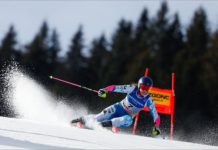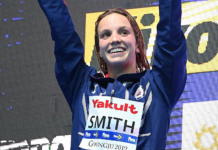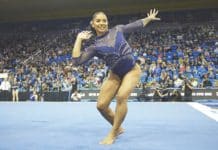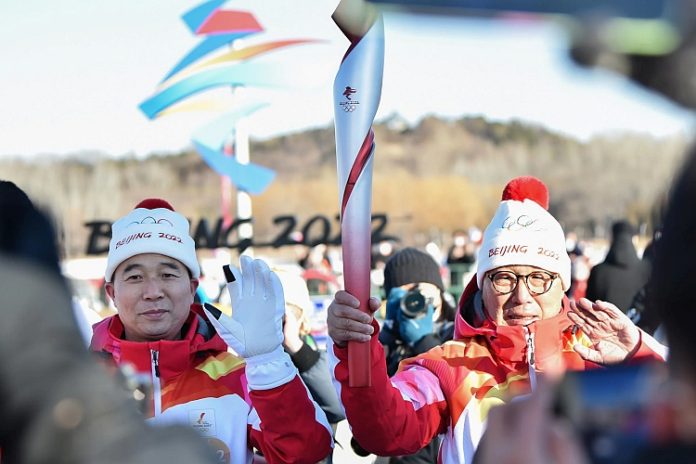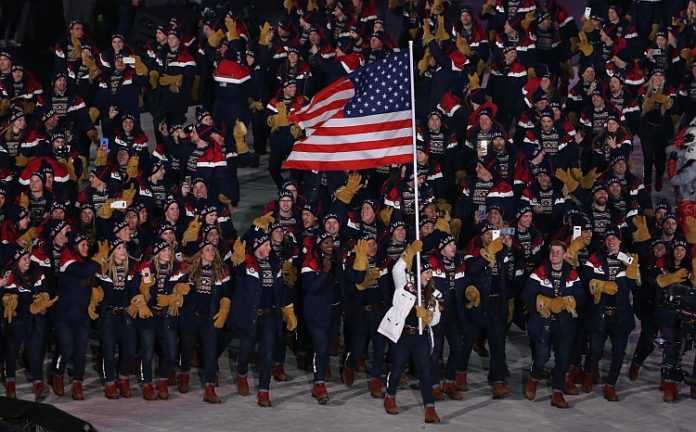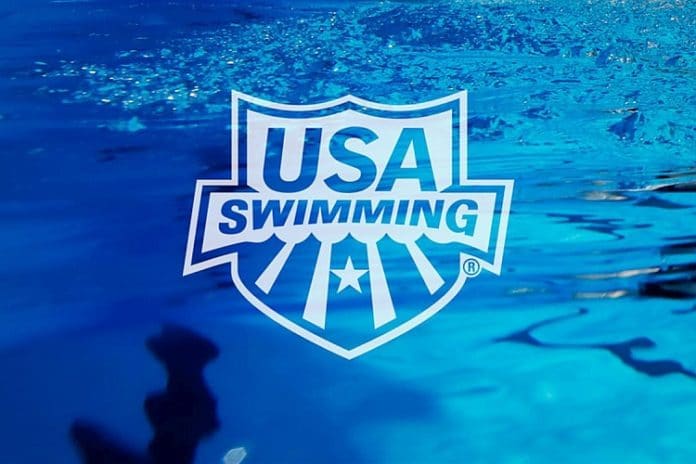The latest news, notes and quotes from the worldwide Five-Ring Circus:
≡ BEIJING 2022 ≡
Covid controls at the Olympic Winter Games are working as expected, according to Dr. Brian McCloskey (GBR), head of the Expert Medical Panel for the Games. In a Wednesday news briefing, he explained that people coming to Beijing for the Games have been tested before they leave, then tested again upon arrival and then move into the “closed-loop management system,” with each stage reducing the risk of infection and transmission:
“When they get inside the closed loop, the risk of testing positive is lower still, because the airport testing has identified people traveling who might become infectious and has removed them from the system.
“So, in the closed loop, we’re starting to see a lower risk of being positive. But for the first few days in the closed loop, the risk is still a bit higher because of the risk of people incubating the disease very slowly. But after 4-5 days in the closed loop, the risk comes down to equivalent to the local population’s risk: very, very low.
“At that stage, when we’re working within the closed loop, effectively, everyone we meet has been tested negative within the last 24 hours and almost all of them, over 95%, have been vaccinated. So your risk of testing positive after the first 3-5 days goes down.”
Asked about the situation for those who have tested positive:
“The vast majority of people who are positive are well. A lot of them are asymptomatic. There have been 11 people hospitalized because they have a symptom. None of those are seriously ill in any way.”
According to the testing report through 1 February, 15 new cases were reported at the airport and 17 inside the closed loop. Of these 32 new cases, only nine were either athletes or team officials.
Since the closed loop began operation on 4 January, there have been 76 cases among athletes and team officials, with 57 at the airport (out of 4,364 tests: 1.3%) and 19 in the Villages (out of 14,440 tests: 0.1%). Among the other stakeholders, there have been 228 positives, with 145 at the airport (out of 8,088 tests: 1.8%) and 83 in the closed loop (out of 853,949 tests: 0.1%).
¶
Competition actually started on Wednesday, with round-robin play in the Curling Mixed Doubles. Britain’s Bruce Mouat and Jennifer Dodds scored four times in the final ends to edge Sweden’s Almida de Val and Oskar Eriksson, 9-5, in the opening event of the 2022 Games.
Americans Vicky Persinger and Christopher Plys came from 3-5 down to win, 6-5, with two points in the seventh end and one in the eighth to defeat Australia’s Tahli Gill and Dean Hewitt.
¶
The U.S. team elected bobsledder Elana Meyers Taylor and curling gold medalist John Shuster were elected as flag bearers for the U.S. delegation at the Opening Ceremony on Friday. About 180 members of the U.S. squad are expected to participate.
Meyers Taylor, a three-time Olympic medalist, announced that she has Covid and will not march in the ceremony, but is hopeful of recovering in time to drive in the Games. She will be replaced by speedskater Brittany Bowe, who finished second in the voting. Under a pre-Tokyo 2020 rule change, the International Olympic Committee now allows two flagbearers to be selected – if desired – by a National Olympic Committee.
As for the health of the U.S. delegation, the USOPC tweeted:
“Of the 428 U.S. Olympic delegates in China on Feb. 1, no new COVID cases were confirmed. Seven remain in insolation as previously reported, including two athletes.”
¶
The National Olympic Committee of Taiwan – known as Chinese Taipei in Olympic circles – reversed its announcement from last week that it would not participate in the Opening Ceremony. Reports indicated that the International Olympic Committee informed the NOC that it had a responsibility to have a presence in the ceremony.
Taiwan has four athletes coming to the Games, but it is more likely that other members of its delegation will actually march in the opening.
¶
Reuters reported Monday that Huang Feng, a Chinese figure skating judge who was suspended for a year for biased judging in the Pairs event at the 2018 PyeongChang Winter Games, is listed as a part of the judging team for Beijing.
Huang has been designated as a technical controller, “an official who supervises technical specialists and can propose corrections regarding the level of difficulty identified for a given element.”
No comment from the International Skating Union.
¶
There will be some spectators at the Beijing Games, and the Beijing organizing committee issued regulations for ticket holders on Tuesday. Along with the standard language seen for almost any event on the planet, there were also prohibitions:
“A Session shall not be attended with counterfeit or void Tickets, and Beijing 2022 will not be liable in any way for the acquisition of counterfeit or void Tickets. Tickets must only be acquired from an [Authorized Ticket Seller].”
And among the items not to be brought into a venue are:
“(1) fragile items and various containers, including but not limited to glass bottles / cups, thermos cups and ice boxes;
“(2) all kinds of soft and hard packaged beverages, especially alcoholic beverages; and throwing food (such as a large number of fruits or eggs, etc.) that exceeds the Ticket Holder’s personal use;
“(3) banners, placards and other propaganda items that contain political, racial, religious or commercial contents and/or violate the Olympic Charter, the IPC Handbook or PRC laws and regulations.”
“Throwing food?” Wow.
¶
The Covid-shortened three-day Olympic Torch Relay got started on Wednesday, with 80-year-old former speed skating world-record holder Luo Zhihuan the first to carry. According to the IOC:
“The Torch Relay began in Beijing Olympic Forest Park, and will travel across the three competition zones of Beijing, Yanqing and Zhangjiakou before arriving at the Opening Ceremony.”
About 1,200 torchbearers are expected to participate, some carrying the flame for only about 100 meters in the condensed procession.
¶
A very positive development in the anti-doping fight: the new dried-blood-spot specimen collection technology will be in full use in Beijing.
“DBS” as it is known in anti-doping circles, uses “takes a few drops of blood from the athlete’s fingertip to dry on a blotting paper,” and is hoped to eventually replace urinalysis as the preferred method of specimen collection. DBS samples are much easier and loss costly to store and can provide deeper scientific analysis.
Some 400 tests were done at the Tokyo Games as a trial, which was considered successful.
¶
The International Testing Agency announced that 80% of its recommended 5,400 targets – athletes and teams – had been implemented in the pre-Games period. Per the ITA:
“This result means that 95% of the athletes for whom recommendations were issued have been tested at least once – the remaining athletes are most likely not to participate in the Games as the recommendations were shared ahead of the event for an extended group of athletes before the final qualification processes began.”
Russian athletes were tested the most in total, followed by athletes from Germany, the U.S., Canada and Norway.
¶
The Court of Arbitration for Sport issued notices of decisions from three cases, with all of the appeals denied.
American Megan Henry had asked for an additional entry into the women’s Skeleton event, but was denied, since the USOPC had already filled its quota with qualified athletes. Israeli bobsledder Adam Edelman asked for two spots to enter the two-man competition, but was denied, with the full decision to be released later.
The Irish Bobsleigh & Skeleton Association has for the entry of a four-man sled, but this was also denied, with the decision to be published later.
≡ THE 5-RING CIRCUS ≡
● XIX Olympic Winter Games: Salt Lake City 2002 ● The Utah Olympic Legacy Foundation announced a series of events to celebrate the 20-year anniversary of the 2002 Olympic Winter Games in Salt Lake City.
Events will take place all during February, with a special celebration on 12 February at Bob Wells Plaza in downtown Park City from 2-5 p.m.
The 2002 Olympic cauldron, permanently stationed at Rice-Eccles Stadium at the University of Utah, will be lit from 8-12 February and other events will be held in Salt Lake City, Kearns, Park City, Heber Valley, Ogden and Provo.
● Anti-Doping ● World Anti-Doping Agency President Witold Banka (POL) told reporters during a briefing in Beijing that the question of lifting sanctions on the Russian Anti-Doping Agency (RUSADA) – set to expire at the end of the year – will depend on the performance of that agency.
“At the end of the year we will need to say yes, RUSADA can be compliant. It is not the end of this process, it is too early to say definitely that they are compliant.”
The Russian news agency TASS reported that the review of the data from the infamous Moscow Laboratory data system (LIMS) at the heart of the Russian doping scandal from 2011-15 should be completed by the end of the year. LIMS data has been used to “initiate” 492 cases against athletes from various sports.
¶
The World Anti-Doping Agency says it will begin the evaluation of the use of tizanidine, a relaxant drug used to “treat muscle spasticity due to spinal cord injuries or multiple sclerosis.”
Traces of the drug were found in hair samples of three Tour de France riders in 2021 after a raid that included riders from the Team Bahrain-Merida. WADA has no information about the use of the drug, but will investigate it further. It is not on any prohibited list at this time.
● Athletics ● The Millrose Games on NBC last Saturday had a respectable viewing audience of 929,000 fans in the U.S. according to Nielsen. That’s an 0.64 rating, vs. 0.73 (1.2 million) on CBS for Arizona State-Arizona basketball, 0.75 (1.2 million) for Auburn-Alabama basketball and 952,000 (0.61) for early holes of the final day of the Farmers Insurance Open golf tournament, all on at the same time.
● Football ● The National Soccer Hall of Fame announced on Sunday the election of Shannon Boxx, Clint Dempsey and Hope Solo as new members.
Boxx was a star U.S. defender, appearing in 195 games for the women’s National Team from 2003-15 and won Olympic gold medals with the 2004-08-12 teams and the 2015 FIFA Women’s World Cup.
Solo was the keeper on U.S. women’s teams from 2000-16, appearing in 202 games and had 102 shutouts to her credit. She was a member of the 2004-08 Olympic winners and the 2015 Women’s World Cup champions.
Dempsey as a star striker for the U.S. men’s teams from 2004-17, scoring 57 goals and playing in the 2006-10-14 World Cups. He scored 129 goals in club play for two MLS squads and two English teams from 2004-18.
¶
The National Women’s Soccer League (NWSL) announced Monday its first collective-bargaining agreement with its players, covering the five seasons from 2022-26.
Minimum player salaries were increased to $35,000 (up by 60%) and “total compensation” to include “salary, free housing, transportation, fully-vested 401(k) contributions, health, life and disability insurance, among other material benefits” to $54,000 per years.
Also included was a revenue-sharing provision, “introducing the opportunity for players to receive 10% of the net broadcast revenues, if the league is profitable in years 3, 4, and 5 of the CBA.”
The announcement noted that the new agreement is “projected to require an additional incremental investment by NWSL owners of nearly $100 million.” The league has 12 teams at present, including new clubs for 2022 in Los Angeles and San Diego; the 2021 season saw games played from May through October, with playoffs in November.
● Gymnastics ● Another step forward in the USA Gymnastics bankruptcy case, as the U.S. Bankruptcy Court for the Southern District of Indiana granted a motion authorizing the Settlement Trustee to begin the claims process.
The motion was unopposed and granted by the Court today.
● Modern Pentathlon ● The Pentathlon United athletes group tweeted yesterday it’s four-point summary of why it is fighting the UIPM leadership on the replacement of riding as part of the sport.
The graphic notes that 667 athletes signed a petition asking for the UIPM leadership to resign, that Klaus Schormann (GER) has now served 28-plus years as the federation’s president, that 43 Olympic medalists signed on to a letter asking for the IOC to overrule the UIPM decision to eliminate riding, and
“>75% Pentathletes do not want anything considered other than equestrian. If the UIPM is not working on improving equestrian, then it is not listening.”
In the meantime, the UIPM’s discussions on a replacement for riding continue, essentially ignoring the athlete group.
● Swimming ● FINA formally announced that the 2022 World Aquatics Championships scheduled for May in Japan will instead be held from 14-30 July 2023 in Fukuoka, Japan. The 2023 Worlds scheduled for Doha, Qatar, will be moved to January of 2024.
Said FINA President Husain Al-Musallam (KUW), “Given the current pandemic situation and the measures currently in place in Japan, FINA and key stakeholders of the Fukuoka 2022 Organising Committee have agreed to reschedule the 19th FINA World Championship.”
¶
USA Swimming announced its “Athlete Inclusion Procedures” dealing with the transgender issue on Tuesday, but carefully defined the process as “applicable only to USA Swimming athlete members and approved elite events as defined in the policy and will remain in place until the release of an elite policy by FINA.”
That specifically does not cover NCAA swimmers – such as Penn senior Lia Thomas – who are not members of the federation.
Further, the procedures split elite and non-elite swimmers into different groups, but this is defined by time standards and a desire to compete in “elite events.”
More on this in a forthcoming post.
≡ SCOREBOARD ≡
● Football ● The U.S. men’s National Team plays its final games in the current window of CONCACAF World Cup qualifying matches in frigid St. Paul, Minnesota tonight vs. Honduras at 7:30 p.m. Eastern time. The game will be shown in the U.S. on FS1, Univision and TUDN.
Temperatures are expected to be about 7 F and feeling colder due to winds of up to 15 miles per hour. In the Honduran capital of Tegucigalpa, the high on Wednesday was 86 F.
The U.S. Soccer Federation is providing all fans brave enough to come out a pair of free handwarmers, designated warming stations, added medical stations, additional hot food and beverage options. Allianz Field has heating technology to keep the field from freezing, but this is expected to be coldest conditions ever for a U.S. Men’s National Team game.
The U.S. sits second in the CONCACAF qualifying standings with 18 points (5-2-3), essentially tied with Mexico, with Canada ahead at 6-0-4 and 22 points. Panama has 17 in fourth place; the top three automatically qualify for the 2022 FIFA World Cup in Qatar in November.
Honduras is at the bottom of the standings at 0-7-3 (3 points) and has been eliminated from World Cup contention.
The television viewership for tonight’s (must-win) match will be interesting. The U.S.’s 1-0 win over El Salvador last Thursday had 727,000 viewers and a 0.40 rating on ESPN2.
You can receive our exclusive TSX Report by e-mail by clicking here. You can also refer a friend by clicking here, and can donate here to keep this site going.
For our 832-event International Sports Calendar for 2022 and beyond, by date and by sport, click here!










